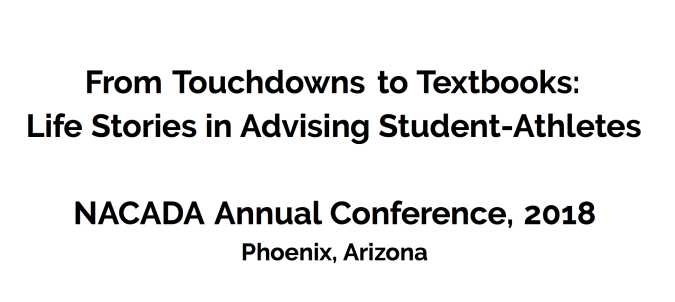
What an amazing opportunity to visit with the membership of NACADA on the topic of Advising Student-Athletes. You can hear the entire presentation here:
NACADA Annual Conference 2018 – Sept. 30-Oct. 3; Phoenix, AZ
Conference Theme: Life Stories: The Art of Academic Advising
Katharine Moffat (U of Hawaii at Manoa), Will Lewis (U of Georgia), Wes Maas (Florida International), Kaydee Emperley (Washburn U)
According to the National Collegiate Athletics Association (NCAA), more than 460,000 student-athletes participate in 24 NCAA-governed sports every year (NCAA, 2018). Academic Advisors, Athletic Advisors, and Athletic Administrative staff at NCAA member institutions across the country are called on to offer academic support and guidance to this large, unique student population. Collaboration amongst the numerous individuals that student-athletes receive advising and guidance from is essential in helping this population navigate higher education successfully (Rubin, 2015). Academic and Athletic Advisors, as well as Athletic Administrators, all have distinct perspectives of the student-athlete experience that should be shared within and across campuses.
This panel, “From Touchdowns to Textbooks: Life Stories in Advising Student-Athletes”, is comprised of experienced members of the Academic Advising, Athletic Advising, and Athletic Administration communities at varying levels of NCAA competition. Through the use of guided questions, panelists will share with attendees their life stories in working with student-athletes, offer insight into their approaches to advising this population, and share strategies for helping students navigate the complex intersections between athletic participation and academics. Panelists from various backgrounds and experiences will share their problem-solving techniques used to assist student-athletes in balancing several important facets of life.
As a result of participation in this panel session, participants will engage with the following learning outcomes associated with the Conceptual, Informational, and Relational components of the NACADA Core Competencies Model (NACADA, 2017):
- Develop relational competence of how individuals in advising and administration at different institutions support student-athletes’ academic and personal development
- Develop relational competence about the varying approaches to advising student-athletes and understanding their life stories
- Develop informational competence of the many varying characteristics that make up the student-athlete population
- Develop conceptual competence of advising approaches appropriate for working with student-athletes
- Develop conceptual competence in creating an equitable and inclusive environment for student-athletes on campus.
Panelists will begin the session by briefly describing their current roles and advising and administrative experiences. Then, a moderator will ask questions of each panelist including, but not limited to, the following:
Reflective Questions
- What has been your best experience working with student-athletes?
- What has been your most challenging experience working with student-athletes?
Scenario Questions
- A freshman student-athlete comes to campus wanting to pursue a time-intensive major like Engineering. How might you help this student in pursuit of this particular major?
- A student-athlete is struggling with motivation in class after an injury has ended their season. How might you work with this student?
- A student-athlete has recently determined to quit their team and end their playing career. How might you work with this student as they transition away from Athletics?
- How might your work with a student-athlete who has aspirations of a professional career in their sport and has yet to select a college major?
Forecasting Questions
- There has been a lot of ongoing dialogue about the possibility of allowing student-athletes to be able to transfer Universities without restriction. How would you see such a change affecting your interactions and conversations with students?
- Earlier this year, The Chronicle of Higher Education published articles discussing which campus entity should be looking after student-athlete academic success – the academic side (ex. Provost’s Office or Office of Instruction) or the Athletic Department – (Kelderman, 2018) and the funneling of student-athletes into certain majors on campus (Stripling, 2018). Have you encountered issues like these in working with student-athletes and what has been your response?
- What changes regarding the student-athlete experience would you like to see happen?
Throughout the panel session and at its conclusion, audience members will have opportunities to ask their own questions of the panelists and contribute additional perspectives.
References
Kelderman, E. (2018, January 28). Who should oversee athletes’ academic progress? The
Chronicle of Higher Education. Retrieved from https://www.chronicle.com/article/Who-Should-Oversee-Athletes-/242351.
NACADA: The Global Community for Academic Advising. (2017). NACADA academic advising
core competencies model. Retrieved from https://www.nacada.ksu.edu/Resources/Pillars/CoreCompetencies.aspx.
National Collegiate Athletics Association (NCAA). (2018, February). What is the NCAA?.
Retreived from http://www.ncaa.org/about/resources/media-center/ncaa-101/what-ncaa.
Rubin, L.M., (2015). Advising student-athletes. Retrieved from the NACADA Clearinghouse of
Academic Advising Resources, http://www.nacada.ksu.edu/Resources/Clearinghouse/View-Articles/Advising-Student-Athletes.aspx.
Stripling, J. (2018, February 16). Inside Auburn’s secret effort to advance an athlete-friendly
curriculum. The Chronicle of Higher Education. Retrieved from https://www.chronicle.com/article/Inside-Auburn-s-Secret/242569.
Abstract:
According to the National Collegiate Athletics Association (NCAA), more than 460,000 student-athletes participate in 24 NCAA-governed sports every year. Academic Advisors, Athletic Advisors, and Athletic Administrative staff at NCAA member institutions offer academic support and guidance to this large, unique student population.
This panel, “From Touchdowns to Textbooks: Life Stories in Advising Student-Athletes”, is comprised of experienced members of the academic advising, athletic advising, and athletic administration communities at institutions of varying levels of NCAA competition. Panelists will share with attendees their life stories in working with student-athletes, offer insight into their approaches to advising student-athletes, and share strategies for helping students navigate the complex intersections between athletic participation and academic success. Through participation in this panel, audience members will work to develop the relational, informational, and conceptual competencies needed to support student-athletes.